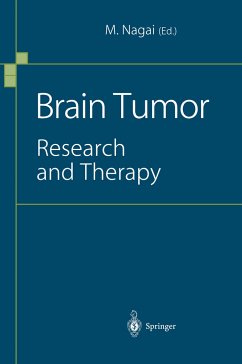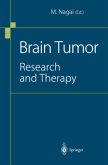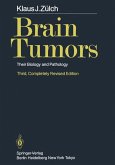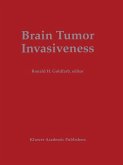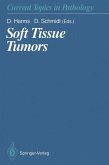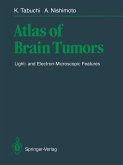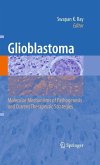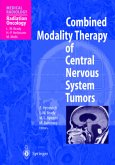Brain Tumor
Research and Therapy
Herausgegeben:Nagai, Masakatsu
Brain Tumor
Research and Therapy
Herausgegeben:Nagai, Masakatsu
- Gebundenes Buch
- Merkliste
- Auf die Merkliste
- Bewerten Bewerten
- Teilen
- Produkt teilen
- Produkterinnerung
- Produkterinnerung
The title of this monograph, Brain Tumor Research and Therapy, is the name of the Conference itself, which had its inaugural meeting in the United States in 1975 andhas since progressed to the international scale. In Japan, the first conference ofits kind was organized by Dr. Takao Hoshino and me and was held at Nikko in 1980, hence its name, the Nikko Conference on Brain Tumor Research and Therapy. Though it started as a small, closed meeting, the conference has grown considerably, and in 1992 it was reorganized as the Japanese Conference on Brain Tumor Research and Therapy and was opened to…mehr
Andere Kunden interessierten sich auch für
![Brain Tumor Brain Tumor]() Brain Tumor39,99 €
Brain Tumor39,99 €![Brain Tumors Brain Tumors]() Klaus-Joachim ZülchBrain Tumors78,99 €
Klaus-Joachim ZülchBrain Tumors78,99 €![Brain Tumor Invasiveness Brain Tumor Invasiveness]() Brain Tumor Invasiveness149,99 €
Brain Tumor Invasiveness149,99 €![Soft Tissue Tumors Soft Tissue Tumors]() Soft Tissue Tumors75,99 €
Soft Tissue Tumors75,99 €![Atlas of Brain Tumors Atlas of Brain Tumors]() Kazuo TabuchiAtlas of Brain Tumors38,99 €
Kazuo TabuchiAtlas of Brain Tumors38,99 €![Glioblastoma: Glioblastoma:]() Swapan K. Ray (Hrsg.)Glioblastoma:153,99 €
Swapan K. Ray (Hrsg.)Glioblastoma:153,99 €![Combined Modality Therapy of Central Nervous System Tumors Combined Modality Therapy of Central Nervous System Tumors]() Zbigniew Petrovich / Luther W. Brady / Michael L.J. Apuzzo / Michael Bamberg (eds.)Combined Modality Therapy of Central Nervous System Tumors115,99 €
Zbigniew Petrovich / Luther W. Brady / Michael L.J. Apuzzo / Michael Bamberg (eds.)Combined Modality Therapy of Central Nervous System Tumors115,99 €-
-
-
The title of this monograph, Brain Tumor Research and Therapy, is the name of the Conference itself, which had its inaugural meeting in the United States in 1975 andhas since progressed to the international scale. In Japan, the first conference ofits kind was organized by Dr. Takao Hoshino and me and was held at Nikko in 1980, hence its name, the Nikko Conference on Brain Tumor Research and Therapy. Though it started as a small, closed meeting, the conference has grown considerably, and in 1992 it was reorganized as the Japanese Conference on Brain Tumor Research and Therapy and was opened to all neurosurgeons and neuropathologists interested in the study of brain tumor problems and who are participating in this field. The main purpose of the Conference on Brain Tumor Research and Therapy is the candid and informed discussion of the most up-to-date developments in basic re search and clinical treatment of brain tumors. The 3rd Japanese Conference on Brain Tumor Research and Therapy was held at Nasu (Tochigi Prefecture), Japan, in No vember 1994. It was a great honor to welcome many distinguished guests from over seas who kindly attended each session and made valuable contributions.
Hinweis: Dieser Artikel kann nur an eine deutsche Lieferadresse ausgeliefert werden.
Hinweis: Dieser Artikel kann nur an eine deutsche Lieferadresse ausgeliefert werden.
Produktdetails
- Produktdetails
- Verlag: Springer / Springer Japan / Springer, Berlin
- Artikelnr. des Verlages: 978-4-431-70164-4
- 1996.
- Seitenzahl: 472
- Erscheinungstermin: 28. Januar 1996
- Englisch
- Abmessung: 241mm x 160mm x 31mm
- Gewicht: 940g
- ISBN-13: 9784431701644
- ISBN-10: 4431701648
- Artikelnr.: 34999755
- Herstellerkennzeichnung
- Springer-Verlag GmbH
- Tiergartenstr. 17
- 69121 Heidelberg
- ProductSafety@springernature.com
- Verlag: Springer / Springer Japan / Springer, Berlin
- Artikelnr. des Verlages: 978-4-431-70164-4
- 1996.
- Seitenzahl: 472
- Erscheinungstermin: 28. Januar 1996
- Englisch
- Abmessung: 241mm x 160mm x 31mm
- Gewicht: 940g
- ISBN-13: 9784431701644
- ISBN-10: 4431701648
- Artikelnr.: 34999755
- Herstellerkennzeichnung
- Springer-Verlag GmbH
- Tiergartenstr. 17
- 69121 Heidelberg
- ProductSafety@springernature.com
Histopathological Classification of Brain Tumors According to the Revised WHO Classification: Current State and Perspectives.- Histological Aspects of Certain Benign Brain Tumors: Review of Current Topics.- The Statistical Analysis of Prognostic Factors for Brain Tumors.- Evaluation of Histological Grading Systems of Astrocytic Tumors.- Histological and Radioimaging Study of Malignant Change in Low-Grade Astrocytoma.- Clinicopathological Study of Mixed Oligoastrocytoma.- Metallothionein in Gliomas.- Histological Grading of Meningioma Based on MIB-1 Immunoreactivity.- Incidental Meningiomas in Autopsy Cases in Computed Tomography and Magnetic Resonance Imaging Era.- Clinicopathological Study of Malignant Meningiomas.- Expression of L1 CAM in Brain Tumors: Immunohistochemical Study Using Anti-L 1 CAM Antibodies.- Expression and Biological Functions of L1 Cell Adhesion Molecule in Malignant Glioma Cells.- The Role of Urokinase-Type Plasminogen Activator in the Invasion and Proliferation of Malignant Brain Tumors.- Stemline Study Based on the Nuclear Characterization and Image Cytometry in Resected Brain Tumors.- Efficiency of Glioma Score in Glioma Patients Using Proliferating Potential with MIB-1 Monoclonal Antibody.- Molecular Analysis of Phosphorylated Tyrosine-Binding Proteins in the Transduction of Proliferation and Differentiation Signals.- Gene Alterations in Glial Tumors.- A Model for the Molecular Pathogenesis of Astrocytic Gliomas.- Molecular Genetics of Oligodendroglial Tumors.- The Correlation Between fig Gene Expression and the Progression of Glioma.- Expression of trk Proto-Oncogene Product in Medulloblastoma.- Differential Expression of FGF Receptor-1 and FGF Receptor-2 Is Associated with Malignant Progression of Gliomas.- Point Mutations of Epidermal GrowthFactor Receptor Transcripts in Primary Human Malignant Gliomas.- Expression of Vascular Endothelial Growth Factor in Human Brain Tumors In Vivo.- Studies of Retinoblastoma and p53 Gene Mutations in Human Astrocytomas.- Immunohistochemical Assessments of P53 Protein Accumulation and Tumor Growth Fraction During the Progression of Astrocytomas.- Homozygous Deletion of the p16 Gene in Malignant Glioma.- Detection of Binding Proteins of Merlin, the NF2 Tumor Suppressor Gene Product.- Mutations and Loss of Heterozygosity of the von Hippel-Lindau Tumor Suppressor Gene in Sporadic Central Nervous System Hemangioblastomas.- Anti-Fas Antibody Induces Apoptosis in Cultured Glioma Cells by Activation of the Sphingomyelin Pathway.- Induction of Apoptosis in Malignant Glioma Cells by Anti-Fas Antibody.- Monocyte Chemoattractant Protein-1 (MCP-1) Derived from Brain Tumors: Its Significance and Clinical Application.- Experimental Analysis of Proto-Oncogene and Histocompatibility Antigen Gene Expression During Brain Tumor Progression.- Suppressed Expression of T-Cell Costimulatory Molecules B7 and B70 in Human Glioblastomas In Vivo.- Clinical Trials with Interferon-Alpha as a Chemosensitizer in Gliomas.- Evaluation of Interferon Therapy on Malignant Gliomas.- Clinical Results of Specific Targeting Therapy Against Patients with Malignant Glioma.- Structural Analysis of Anti-Cancer Antibody, CLN-IgG and Anti-Idiotypic Antibody, Idio-No.3, for the Study of Idiotope Image Transmission: An Insight into Antigen-Specific Human Monoclonal Antibody Therapy.- Clinical Effect of CLN-IgG on Glioma and Its Correlation with the Induction of Antianti-Idiotypic Antibody in the Serum.- Gene Therapy for Central Nervous System Tumors.- Application of the Apoptotic Gene to Gene Therapy of Malignant Gliomas.- Experimental Therapy for Malignant Brain Tumors Using Genetically Engineered Herpes Simplex Virus Type 1.- Investigations of Retroviral-Mediated Gene Therapy for Malignant Glioma: Transduction with HTK-Bearing Retroviruses Sensitizes Glioma Cells to Ganciclovir.- Cytokine Gene Therapy of Malignant Glioma by Means of DNA/Liposomes.- Analysis of sdi-1 Gene Functions in Human Malignant Gliomas.- Antisense DNA Approach to the Growth of Human Glioma Cells.
Histopathological Classification of Brain Tumors According to the Revised WHO Classification: Current State and Perspectives.- Histological Aspects of Certain Benign Brain Tumors: Review of Current Topics.- The Statistical Analysis of Prognostic Factors for Brain Tumors.- Evaluation of Histological Grading Systems of Astrocytic Tumors.- Histological and Radioimaging Study of Malignant Change in Low-Grade Astrocytoma.- Clinicopathological Study of Mixed Oligoastrocytoma.- Metallothionein in Gliomas.- Histological Grading of Meningioma Based on MIB-1 Immunoreactivity.- Incidental Meningiomas in Autopsy Cases in Computed Tomography and Magnetic Resonance Imaging Era.- Clinicopathological Study of Malignant Meningiomas.- Expression of L1 CAM in Brain Tumors: Immunohistochemical Study Using Anti-L 1 CAM Antibodies.- Expression and Biological Functions of L1 Cell Adhesion Molecule in Malignant Glioma Cells.- The Role of Urokinase-Type Plasminogen Activator in the Invasion and Proliferation of Malignant Brain Tumors.- Stemline Study Based on the Nuclear Characterization and Image Cytometry in Resected Brain Tumors.- Efficiency of Glioma Score in Glioma Patients Using Proliferating Potential with MIB-1 Monoclonal Antibody.- Molecular Analysis of Phosphorylated Tyrosine-Binding Proteins in the Transduction of Proliferation and Differentiation Signals.- Gene Alterations in Glial Tumors.- A Model for the Molecular Pathogenesis of Astrocytic Gliomas.- Molecular Genetics of Oligodendroglial Tumors.- The Correlation Between fig Gene Expression and the Progression of Glioma.- Expression of trk Proto-Oncogene Product in Medulloblastoma.- Differential Expression of FGF Receptor-1 and FGF Receptor-2 Is Associated with Malignant Progression of Gliomas.- Point Mutations of Epidermal GrowthFactor Receptor Transcripts in Primary Human Malignant Gliomas.- Expression of Vascular Endothelial Growth Factor in Human Brain Tumors In Vivo.- Studies of Retinoblastoma and p53 Gene Mutations in Human Astrocytomas.- Immunohistochemical Assessments of P53 Protein Accumulation and Tumor Growth Fraction During the Progression of Astrocytomas.- Homozygous Deletion of the p16 Gene in Malignant Glioma.- Detection of Binding Proteins of Merlin, the NF2 Tumor Suppressor Gene Product.- Mutations and Loss of Heterozygosity of the von Hippel-Lindau Tumor Suppressor Gene in Sporadic Central Nervous System Hemangioblastomas.- Anti-Fas Antibody Induces Apoptosis in Cultured Glioma Cells by Activation of the Sphingomyelin Pathway.- Induction of Apoptosis in Malignant Glioma Cells by Anti-Fas Antibody.- Monocyte Chemoattractant Protein-1 (MCP-1) Derived from Brain Tumors: Its Significance and Clinical Application.- Experimental Analysis of Proto-Oncogene and Histocompatibility Antigen Gene Expression During Brain Tumor Progression.- Suppressed Expression of T-Cell Costimulatory Molecules B7 and B70 in Human Glioblastomas In Vivo.- Clinical Trials with Interferon-Alpha as a Chemosensitizer in Gliomas.- Evaluation of Interferon Therapy on Malignant Gliomas.- Clinical Results of Specific Targeting Therapy Against Patients with Malignant Glioma.- Structural Analysis of Anti-Cancer Antibody, CLN-IgG and Anti-Idiotypic Antibody, Idio-No.3, for the Study of Idiotope Image Transmission: An Insight into Antigen-Specific Human Monoclonal Antibody Therapy.- Clinical Effect of CLN-IgG on Glioma and Its Correlation with the Induction of Antianti-Idiotypic Antibody in the Serum.- Gene Therapy for Central Nervous System Tumors.- Application of the Apoptotic Gene to Gene Therapy of Malignant Gliomas.- Experimental Therapy for Malignant Brain Tumors Using Genetically Engineered Herpes Simplex Virus Type 1.- Investigations of Retroviral-Mediated Gene Therapy for Malignant Glioma: Transduction with HTK-Bearing Retroviruses Sensitizes Glioma Cells to Ganciclovir.- Cytokine Gene Therapy of Malignant Glioma by Means of DNA/Liposomes.- Analysis of sdi-1 Gene Functions in Human Malignant Gliomas.- Antisense DNA Approach to the Growth of Human Glioma Cells.

